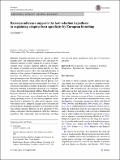Bayesian inference supports the host selection hypothesis in explaining adaptive host specificity by European bitterling
Abstract
Generalist parasites have the capacity to infect multiple hosts. The temporal pattern of host specificity by generalist parasites is rarely studied, but is critical to understanding what variables underpin infection and thereby the impact of parasites on host species and the way they impose selection on hosts. Here, the temporal dynamics of infection of four species of freshwater mussel by European bitterling fish (Rhodeus amarus) was investigated over three spawning seasons. Bitterling lay their eggs in the gills of freshwater mussels, which suffer reduced growth, oxygen stress, gill damage and elevated mortality as a result of parasitism. The temporal pattern of infection of mussels by European bitterling in multiple populations was examined. Using a Bernoulli Generalized Additive Mixed Model with Bayesian inference it was demonstrated that one mussel species, Unio pictorum, was exploited over the entire bitterling spawning season. As the season progressed, bitterling showed a preference for other mussel species, which were inferior hosts. Temporal changes in host use reflected elevated density-dependent mortality in preferred hosts that were already infected. Plasticity in host specificity by bitterling conformed with the predictions of the host selection hypothesis. The relationship between bitterling and their host mussels differs qualitatively from that of avian brood parasites.
Citation
Smith , C 2017 , ' Bayesian inference supports the host selection hypothesis in explaining adaptive host specificity by European bitterling ' , Oecologia , vol. 183 , no. 2 , pp. 379-389 . https://doi.org/10.1007/s00442-016-3780-5
Publication
Oecologia
Status
Peer reviewed
ISSN
0029-8549Type
Journal article
Description
Funding came from the Czech Science Foundation (13-05872S).Collections
Items in the St Andrews Research Repository are protected by copyright, with all rights reserved, unless otherwise indicated.

